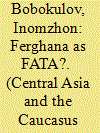| Srl | Item |
| 1 |
ID:
134721


|
|
|
|
|
| Summary/Abstract |
Dependence on foreign oil has long been considered a national security issue in the United States. Yet imports from some countries, such as Canada, are seen as a benign form of economic interdependence that yields gains from trade for both parties. Literature on energy interdependence usually conceives of dependency as an objective material condition whose political implications can be accessed through sober cost/benefit analysis. By contrast, this article argues that dependency is best seen as a discourse and that assessments of the costs and benefits of dependency are shaped by cultural constructions of geography. A critical constructivist approach to interdependence is developed to make this case. US dependence on Middle Eastern oil serves as an example to illustrate the argument. It is argued that American representations of the Arab world as America’s principal cultural Other have precluded a liberal reading of US–Middle Eastern energy interdependence.
|
|
|
|
|
|
|
|
|
|
|
|
|
|
|
|
| 2 |
ID:
136414


|
|
|
|
|
| Summary/Abstract |
The Ferghana Valley and FATA, two areas of regional importance, are gathering global consequence. Their unique geographic/geopolitical location and security issues have made them the main reference objects of Central and South Asian regional security complexes. In the era of the global war on terror, they are growing increasingly attractive for terrorists and extremists. The Ferghana Valley and FATA share a common legacy: the divide and rule policy of colonial powers alienated ethnic, cultural, and civilizational units and created a circumstance responsible for the current and future processes in these regions. The share of security factors (the triad “interests-threats-security), however, in the Ferghana Valley and FATA is not identical.
|
|
|
|
|
|
|
|
|
|
|
|
|
|
|
|
| 3 |
ID:
136284


|
|
|
|
|
| Summary/Abstract |
Having been elected to power with a thumping victory and assuming charge as the fourteenth Prime Minister of Republic of India, Narendra Damodar Modi has helda reputation as an economic performer and an assertive nationalist; thus pointing towards an era of economic interdependence and realism as the hallmarks of Indian Foreign policy.
|
|
|
|
|
|
|
|
|
|
|
|
|
|
|
|
| 4 |
ID:
135148


|
|
|
|
|
| Summary/Abstract |
This article argues that Jawaharlal Nehru’s vision of Asian identity was central to his view of India’s foreign policy. His vision enthused many in the last phases of World War II but the seemingly contradictory elements inherent in this vision ensured that it also had its critics within India, Asia and the world. However, by century’s end, the ideational framework that Nehru had so assiduously constructed since 1920 gained meaning in different contexts after Nehru’s demise. The vision of Asian identity that he put together began to inform Asian regional and subregional institutions and organisations. The analytical framework that he evolved, through non-alignment and the Panchsheel principles, presented an alternative to Cold War binaries. As a result, his view of Asian identity had positive implications for issues of conflict management, economic interdependence and community, the maintainence of peace by abjuring military alliances, guarding against the surrender of sovereign rights and, more recently, for a definition of security as human security. At home the task remains to reinvent his vision for a new phase in India’s foreign policy.
|
|
|
|
|
|
|
|
|
|
|
|
|
|
|
|
| 5 |
ID:
136615


|
|
|
|
|
| Summary/Abstract |
Conventional wisdom has it that political parties have incentives to respond to public opinion. It is also conventional wisdom that in open economies, policymakers must also “respond” to markets. Research on representation has provided ample evidence in support of the first claim. Research on the political economy of globalization has not, however, provided evidence for the second. This article examines the effects of globalization on how parties respond to voters. We argue that while elections motivate parties to respond to public sentiment, economic interdependence distracts political elites from their electorates and toward market actors, reducing party responsiveness to the mean voter. Evidence from a pair of distinct data sources spanning elections in twenty advanced capitalist democracies from the 1970s to 2010 shows that while parties have incentives to respond to left-right shifts in the mean voter position, they only do so when the national economy is sufficiently sheltered from the world economy. These findings have implications for party strategies, for representation, and for the broader effects of market integration.
|
|
|
|
|
|
|
|
|
|
|
|
|
|
|
|